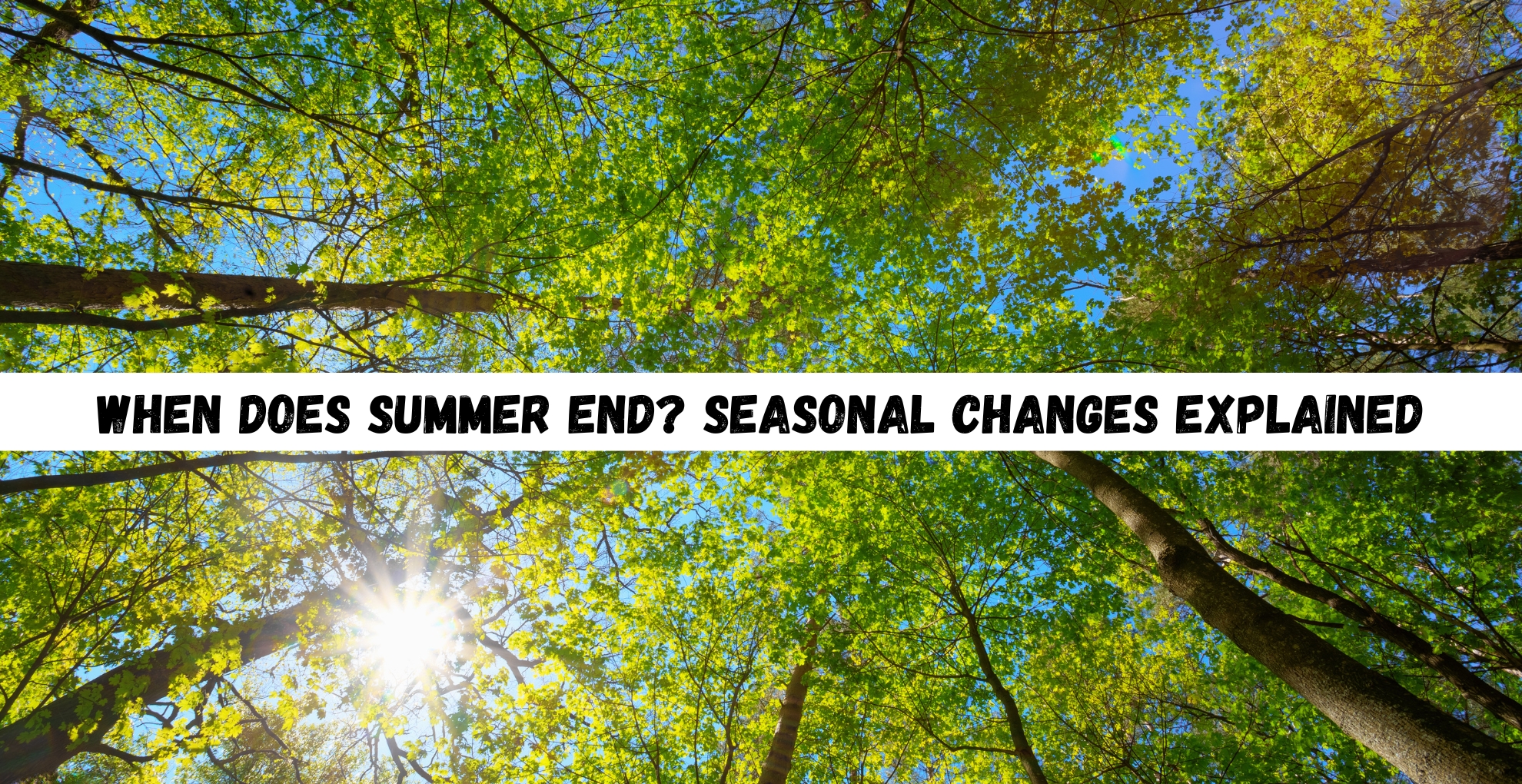The inevitable question begins to cross our minds after months of sunlight, pleasant days, and long, warm evenings: When does summer end? Knowing when summer truly ends allows you to arrange your time—and emotions—appropriately, whether you’re relaxing by the pool, hiking through the mountains, or getting ready to return to work or school.
There is a certain type of magic in the summer. It’s a period when opportunities appear limitless and responsibilities feel lighter. It doesn’t last forever, though, like all wonderful things. Knowing how summer ends, both scientifically and culturally, helps us understand how the seasons change and how we may take advantage of this time of transition.
Understanding What Signals the Summer End
The Role of Earth’s Orbit and Axial Tilt
One basic yet significant fact—the Earth’s tilt on its axis—is the cause of the seasons. Because of the tilt caused by our planet’s orbit around the sun, different regions of the world receive different quantities of sunlight throughout the year. Your area faces the sun throughout the summer, which means that days are longer and temperatures are higher. That tilt progressively moves away as the Earth continues its orbit, marking the start of the gradual descent into fall.
Everything is impacted by this shifting solar angle, including human behavior, cultural customs, wildlife, and the weather. Falling temperatures and thinning tan lines are only a part of a worldwide rhythm that influences our way of life.

Astronomical vs. Meteorological Summer
There are two main ways to define summer’s end, and each offers a different perspective:
Astronomical summer is determined by Earth’s position in orbit. It begins with the summer solstice (around June 20–21 in the Northern Hemisphere) and ends with the autumnal equinox (around September 22–23). During the equinox, day and night are nearly equal in length.
Meteorological summer is based on temperature patterns and the calendar. It runs from June 1 to August 31, offering a tidy three-month period that helps meteorologists track seasonal data more easily.
Depending on whether you’re a scientist or a student, your answer to “When does summer end?” might vary slightly, but both perspectives are valuable.
When Summer Ends Around the World
Northern Hemisphere (U.S., Europe, Asia, North Africa)
In the Northern Hemisphere, summer generally ends around September 22 or 23, when the autumnal equinox occurs. This is when the sun crosses the celestial equator and begins its descent toward the southern skies.
As this transition takes place, we see unmistakable signs: the sunlight softens, the breeze carries a cooler edge, and trees begin to trade their green leaves for vibrant hues of orange, red, and gold. In many countries, this change also kicks off the harvest season—a tradition as old as agriculture itself.
Whether you’re in Canada, Germany, Japan, or Morocco, you’ll notice a similar shift. But cultural experiences of summer’s end can vary. In the U.S., for example, Labor Day in early September often marks the unofficial farewell to summer, while in the UK, late August bank holidays might signal the same.
Southern Hemisphere (Australia, South America, Southern Africa)
While folks in the Northern Hemisphere are reaching for sweaters, those in the Southern Hemisphere are preparing to say goodbye to summer in March. Their autumnal equinox falls around March 20 or 21, when the Earth tilts the opposite way.
Here, December to February is peak summer, just in time for Christmas. Imagine celebrating the holiday season on a sunny beach in Sydney or Buenos Aires! The same rules apply, just on a different schedule.
Despite the reversal, the feelings are universal: as the days shorten and temperatures cool, life slows down and prepares for a new season. Schools resume, vacations end, and cultural calendars turn toward autumn events.

How Seasonal Changes Affect Daily Life
The Return to School and Routine
For millions of students across the globe, the summer end is deeply tied to the academic calendar. Summer break offers a much-needed pause from studies, but all breaks must end. In the U.S., most schools resume classes between mid-August and early September, depending on the district or college system. Those on a semester system usually return earlier, while quarter system institutions may start as late as October.
In Europe, many schools resume in September, and in places like Australia or New Zealand, the school calendar is flipped entirely, with the academic year beginning in January or February and including shorter breaks in between.
This seasonal shift often comes with emotional weight, especially for students transitioning to a new school, grade, or even college. Planning, gradually reintroducing routines, and focusing on goals can help ease the anxiety.
Summer’s Impact on Agriculture and Wildlife
Summer is when life blooms—literally. Crops mature, animals raise their young, and the natural world flourishes. So, when summer ends, farmers begin the harvest, birds start to migrate, and animals prepare for hibernation or cooler weather.
The summer end is more than just symbolic—it’s a trigger for entire ecosystems to change gears. This ancient cycle continues year after year, often unnoticed, yet essential to our survival and the planet’s balance.
Making the Most of the Summer End
Smart Ways to Spend Your Final Summer Days
Before summer slips away, there’s still time to take advantage of the freedom it offers. Here are a few enriching ways to make the most of it:
- Apply for scholarships: Many scholarships, especially through platforms, have summer deadlines. Use this time to prepare materials and submit applications.
- Gain real-world experience: A part-time job, internship, or volunteer position can help build your resume while providing valuable life lessons.
- Travel or explore locally: Whether you’re visiting a new country or discovering hidden gems in your hometown, travel expands your horizons.
- Focus on wellness: Summer is ideal for outdoor activities—go for walks, try yoga in the park, or simply soak in the sun responsibly.
- Pick up a creative hobby: Photography, painting, writing, or playing music—these are perfect summer projects to spark joy and boost your mental well-being.
Preparing for the Fall Transition
Switching gears from summer to school or work doesn’t have to feel jarring. Small habits can smooth the shift:
- Ease back into your sleep schedule to match early mornings.
- Create a study or work plan for the first month back.
- Organize your school supplies or workspace to reduce stress.
- Reflect on your summer—what you learned, loved, and want to carry into the next season.
A new season brings new opportunities. Instead of mourning the summer end, embrace the excitement of starting fresh.

FAQs About the Summer End
Can I apply for scholarships during the summer?
Absolutely! Summer is a great time to apply for scholarships—many deadlines fall during these months. It’s wise to begin your search and applications as early as possible. Even if results aren’t announced until fall, getting ahead gives you a competitive edge.
Can I study abroad during summer break?
Yes. Many universities offer short-term summer study abroad programs. These typically last a few weeks and allow you to earn credits while experiencing a new culture. Check with your academic advisor or study abroad office to explore your options.
Can I stay on campus during the summer?
It depends on your school’s policies. Some universities allow students to remain on campus over the summer, especially if they’re working, taking classes, or participating in research. You’ll want to check early since spots can be limited and may require fees or responsibilities like campus jobs.
Final Thoughts: Embracing Seasonal Change
Summer is more than just a season—it’s a feeling. It symbolizes freedom, fun, and a break from life’s usual pressures. So when it ends, it can stir mixed emotions. But the truth is, every season has its beauty and purpose.
Whether you’re chasing the last rays of sun or gearing up for what’s next, knowing when summer ends gives you the chance to pause, reflect, and move forward intentionally. Let this time mark not just a seasonal shift, but a personal one—one filled with gratitude for what was and hope for what’s to come.
So, soak in the last golden days, plan for the future, and welcome the winds of change. Because just like the Earth’s rhythm, life is always moving, and every ending is just the start of something new.




